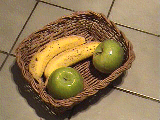 I ran into Andy Brett scavenging for material over on Biopolitical‘s blog not too long ago. I had beaten him to the punch on this one and he generously conceded the topic to me. I then went on vacation and am just now getting around to finishing it.
I ran into Andy Brett scavenging for material over on Biopolitical‘s blog not too long ago. I had beaten him to the punch on this one and he generously conceded the topic to me. I then went on vacation and am just now getting around to finishing it.
Nature (which I subscribe to but have not read yet) published essays from a number of African leaders on the topic of the now-completed G8 summit. One of the contributors, Anthony Nyong from Nigeria, had this to say:
Poverty is a major cause of environmental degradation and causes people to live unsustainably. Take deforestation: people who cut down trees don’t do it for fun: it is a bid to survive. Much of the rural population depends on wood as fuel for domestic energy and cooking. Faced with the need to survive, people even have to encroach on protected forests and game reserves. It is unfair and impractical to think that force can prevent this.
I can only disagree with his assertion that it is impractical to simultaneously protect what remains of Africa’s biodiversity (by force) while trying to reduce poverty. Remove the game park fences, disband the armed patrols and within a decade you would have nothing left to protect. The poor would be right back at square one and the planet’s biodiversity would be that much more impoverished. Allowing the destruction of the Congo and game parks is not necessary and should not be in the solution set.
Nyong continues:
We need to enable farmers to grow their own food in the face of environmental challenges.
Biopolitical dissents in his post “Let’s get out of poverty, or not”:
Growing your own food doesn’t make you rich. Quite the opposite…. What makes you rich is to produce what you are better at, and buy everything else from others. Buy apples from those who are better at growing them. Wealth comes from the efficient division of labor. And global division of labor generates more wealth than local division of labor.
I don’t pretend to know the answers, but Biopolitical makes an interesting point. Subsistence farming is an outmoded living model, along the lines of hunting and gathering, especially in parts of Africa where “environmental challenges” like droughts are frequent and fertility rates are sky-high. It is at best a difficult, unpredictable way to live and, like hunting and gathering, also not the most eco-friendly lifestyle in today’s human-dominated world.
 I ran into Andy Brett scavenging for material over on
I ran into Andy Brett scavenging for material over on 
